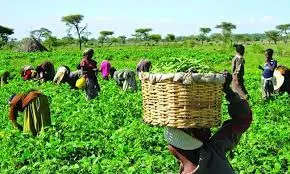For long, Nigerian agricultural policies have been targeted at the political farmers- farmers who have the network and reach to access the never-ending pool of funds made available for agriculture. Hence, these policies rather than affect the activities of small holder farmers only enrich the pockets of political and internet farmers even though small holder farmers are responsible for 90% of the food production in Nigeria and represent 80% of farmers in Nigeria. These policies target the 20% who are imaginary farmers and leave out the important group. Also, Nigerian policy makers are always keen to chase policies which keep the donor agencies happy rather than what appears most practicable and efficient for our agricultural ecosystem. All these need to stop
Tinubu and his agricultural policy consultant must do away with the failed strategies of the past and try out agile solutions that is not rigid but dynamic to meet the constantly changing agro demands and pressure put on agriculture by environmental factors and also security like banditry in the North and soon, parts of the south East. To kick off, the unitary agricultural system whereby the FG sits in Abuja to design agricultural policies to be implemented in the 36 states and the 774 local governments must end. Agriculture draws its strength from the locals who themselves understand their environment and its peculiarities, including what can be adopted quickly and what will not. States must take up the responsibility of designing its agricultural policies taking into cognizance, its farming culture, land use act, population, environmental concerns, climate and soil type. Farmers in Delta do not need to cultivate rice just because those in Jigawa are, or because the FG has a policy that enriches rice farmers. Each state should develop its farming policies using its comparative advantage- We can have the rice belt in the NW, the grain belt in the NE and the fruits and vegetables and livestock belt in the South all flourishing. Agricultural policies must also reflect our environmental challenges-erosion in the South East and desertification in the North and also gender sensitive. The Nutritional needs of the locals must also be factored. Even though agriculture is on the concurrent list and the states are free to develop their agricultural policies the reality is different. The state depends on the FG for any coordinated policy on agriculture. The states offer too little for agricultural development, most especially, states in the south. The Tinubu administration, rather than create a centralised agricultural policy, should have a central theme for the agricultural sector, then allow the states to develop a policy along this theme and then provide a performance based matching grant for any state ready to implement a policy within its central theme. This policy must be driven by the local government.
Previous government agricultural policies have this obsession of laying emphasis on agro-export especially as the FG fx revenue from crude oil continues to thin out. This is seen as a means of diversification. This is wrong. In any case, Nigeria’s export of agricultural products turns out less than $500m quarterly. Nigerian policy makers must think of value addition. Rather than export, Nigeria should focus on produce which has the capacity for huge industrial usage. According to data from PWC, Nigeria’s cumulative agricultural imports between 2016–2019 stood at N3.35 trillion, four times its agricultural export of N803 billion within the same period. Unemployment in Nigeria is over 30% and to turn the tide on unemployment Nigeria needs agriculture. Nigeria needs to focus on cultivating produce that have a wide range of industrial use and create the capacity to process them right here in Nigeria. Research agencies should focus on creating multiple end products from our numerous agro produce so as to trigger more consumption/demand for these produce. Production will not improve if aggregate demand is low. To improve our agricultural production, which is abysmally low, different industrial usage should be extracted from these products beyond that for food consumption. If produce has more usage, demand will increase and with increased demand will come increase in production and with increased production improved employment rate. I have always argued that agro-based manufacturing is the easiest way for any country to activate its manufacturing sector and learn the ropes of manufacturing. With time, as the agro manufacturing sector gets saturated and profits thin out, manufacturers will begin to diversify to other manufacturing concerns drawing from the skills they learnt from agro manufacturing.
Improving aggregate demand will lead to the creation of cottage industries in rural communities triggering a frontal attack on rural poverty. This does not suggest that production of agricultural produce should ignore the need for food consumption and focus on industrial needs only. What we seek is a balance. The Tinubu administration must focus on triggering aggregate demand for our agricultural produce by collaborating with research agencies. Unfortunately, the research agencies have been underfunded. Fortunately, Tinubu in his campaign messages have hinted on increasing aggregate demand for agro products earning him the moniker agbado.
Agricultural policies have continued to fail because of the near absence of data, or manipulated data when it exists. To stop this, the government must have accurate data of all farmers with each farmer mapped to a farm using GIS. Since the local government is the closest government to the people, the local government should be the anchor point for all agricultural programs rather than Abuja or state capitals. All forms of cash incentive to farmers are to be performance based. Government should use a target based incentive whereby farmers are rewarded for meeting set production targets. For instance, government might decide to pay N100,000/ha to any farmer who increases production by 30% in every farming season
Finally, The incoming government must streamline the many government agencies involved in the agricultural sector. Too many competing agencies create negative energy and trigger the creation of different programs which add nothing innovative to the sector beyond being a drain in the purse. The incoming government must attract the private sector into the agro value chain by providing incentives to processors to create new products and create/support private sector driven commodity/future markets for farmers guaranteeing them of purchase whenever they produce.


